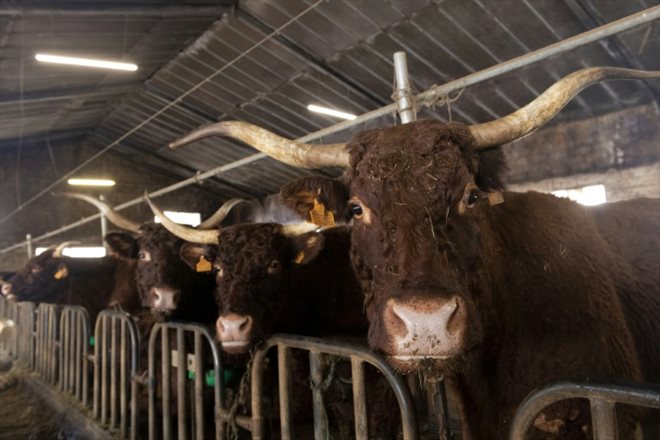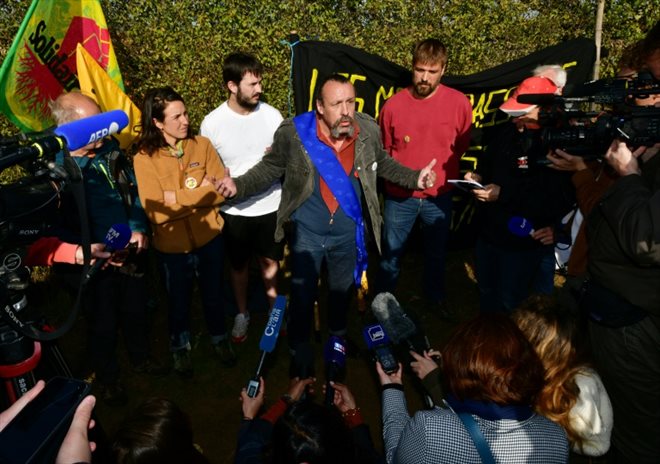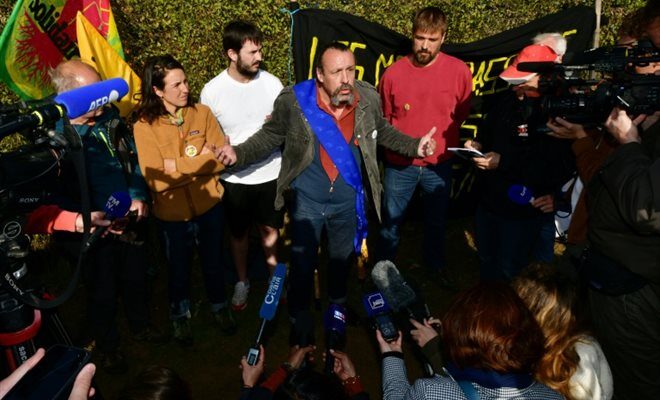A herd of cows in La Clusaz, Haute-Savoie, August 26, 2022 (AFP / JEFF PACHOUD)
The French farming world is sounded Tuesday the day after the recommendation of the Court of Auditors to “define a strategy for reducing” the cattle herd to reduce the carbon footprint of France, while the government strives not to not rob the farmers.
“Reading that your activity must cease or greatly decrease, it is very complicated for breeders” already fewer and fewer, declared to AFP the president of the majority agricultural union FNSEA, Arnaud Rousseau. “It feels like a real injury,” he added.
Prime Minister Elisabeth Borne presented on Monday the reductions in greenhouse gas emissions to be achieved in all sectors by 2030, without detailing the levers. Almost at the same time, the Court of Auditors published a report recommending to “define and make public a strategy for reducing” the cattle herd to respect France’s climate commitments.

Arnaud Rousseau, new president of the FNSEA, during an interview on his farm in Trocy-en-Multien, April 7, 2023 in Seine-et-Marne (AFP / BERTRAND GUAY)
Cattle farming (about 17 million head today) accounts for 11.8% of the country’s emissions, Europe’s leading beef producer and second dairy herd behind Germany. Cows, while digesting, produce and burp methane, a gas with a very warming power.
So far, the government has spared the agricultural sector: it requires less effort from it than from other sectors (industry, transport, energy, etc.) to reduce its harmful emissions for the planet. Above all, he is careful not to set a target for reducing the herd, especially since there are already fewer and fewer cows due to work stoppages or drought.
What is the point of claiming that the number of cows must be reduced, wonders a government source, for whom this can prove to be counterproductive by triggering a “fortress” reflex among breeders, and lead to the situation of Netherlands “which will completely reverse their low carbon strategy”.
The example of the Netherlands is often cited as a foil: the Dutch government’s plan to limit nitrogen emissions, in particular via a drastic reduction in livestock, has sparked the ire of farmers and propelled a populist party to the fore politics in the Senate.
– “Courageous” –

A Salers cow farm in Saint-Alyre-ès-Montagne, in Puy-de-döme, on February 9, 2023 (AFP/Archives/Thierry ZOCCOLAN)
“No, the decline in livestock is not inevitable! No, a Dutch scenario is not inevitable! Yes, we need dairy farming in France!!” tweeted Monday the director general of the federation of dairy processors (Fnil), François-Xavier Huard.
France has lost “nearly a million cows over the past seven years alone. But according to the high administration, our cows are not disappearing quickly enough from French landscapes?” is annoyed, in an open letter to Prime Minister Elisabeth Borne, the Federation of Beef Producers (FNB), a specialized section of the FNSEA.
“We want to know what you are really planning for the future of our sector”, continues the organization, which is worried about the increase in imports of red meat to satisfy the appetite of the French who almost always consume it. as much.

EELV MEP and Charente peasant Benoît Biteau (in the center), in Sainte-Solines in Deux-Sèvres, on November 2, 2022, during an “anti-bass” demonstration (AFP / Archives / PASCAL LACHENAUD)
“Good coordination between the reduction in production on the one hand and consumption on the other is essential”, recalled the Institute of Economics for the Climate (I4CE) in early 2023: “If production decreases to satisfy climate and environmental objectives, but consumption does not follow, then imports increase” and the market shares of French breeders “decrease without climatic or environmental benefits”.
“Trade and food policies must (…) be there to encourage the reduction of meat consumption and protect our farmers from less expensive imports,” said EELV MEP and Charente farmer Benoît in a press release. biteau. For him, the recommendation of the Court of Auditors is “courageous and realistic” because “reducing the cattle herd in Europe is a climatic imperative”.
Livestock professionals rely heavily on innovation (including feed additives that limit the production of methane by cows) to reduce the carbon footprint of red meat and milk. But according to experts, this will not dispense with a reduction in the size of the herd.
© 2023 AFP
Did you like this article ? Share it with your friends with the buttons below.




